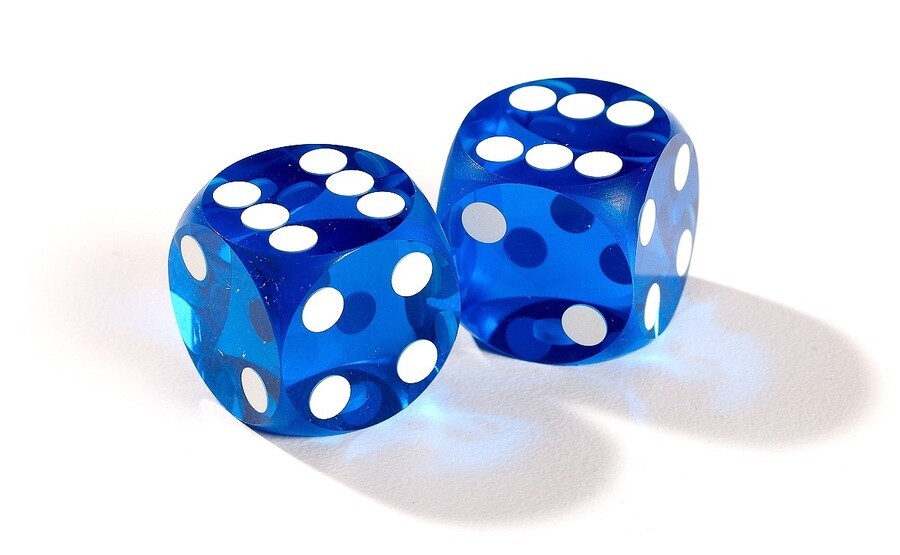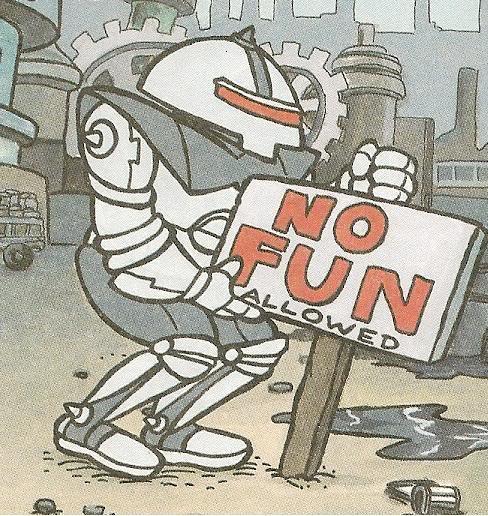
The topic of reviews and our scoring system comes up an awful lot among the Push Square editorial team. Is an out-of-10 scale still the right way to go? Should we move to a 5-star rating? How can we make scoring games easier for our fleet of reviewers? Do we need scores at the end of our reviews at all?
It's something that's needed looking at for quite some time. Ultimately, we wanted to figure out a way of scoring games that complemented the writing process, something that had a degree of flexibility, and that we could build into the site relatively easily. Today, we're finally ready to unveil our brand new scoring system.
Introducing the Push Square review dice.

Each staff member and contributor has been issued a set of two six-sided dice, or d6s for you D&D players out there. They're in a nice blue colour to match our branding -- we think they look pretty spiffy.
Anyway, let's break down how reviews are going to pan out moving forward.
How the Dice Review System Works
It's pretty straightforward stuff. When a review code is sent to a reviewer, they will play through the game as per usual. Once they've completed the game and are able to pen an informed critique, they again do so as normal. This is where the dice come into play. After writing the review itself, the reviewer will then roll the two dice, and whatever number the roll is will become the score for the game. For example, if Sammy Barker is reviewing God of War and rolls a four and a two, God of War will be awarded a 6/10.
It then falls to the editorial staff to nip and tuck the review so that it matches the score. This will eliminate any complaints of a review reading differently to its score.
And we know what you're thinking -- what if we were to roll an 11 or 12? It's a good question, and one with a simple answer. In these cases, we'll award games an 11/10 or 12/10, in a similar fashion to that of the WeRateDogs Twitter account.
There is an alternative to the above method that our reviewers will be free to employ if necessary. If they are short of time or need to write the review in a hurry, they can roll the dice before they write anything, and this will give them a much clearer idea of the kind of review they need to write. As an example, if review code arrives late for Detroit: Become Human and the embargo is only a day or two away, the reviewer can roll the dice -- let's say they rolled a one and a two -- and focus on writing the review without needing to put in hours of playtime.
Why Dice?
We've chosen a dice-based scoring system because it's more flexible, more unpredictable, and more fun than our old method. It adds an element of risk that, while potentially controversial, we hope most of our readers will enjoy.
How Can You Be Sure a Dice Roll is Legitimate?
All dice rolls will be verified with a member of the editorial staff to ensure there's no monkey business. To achieve this, the reviewer must perform the dice roll over a live video feed. There will be a strict rule in place prohibiting re-rolls.
What About Our Older Reviews?
It will be a big undertaking, but we plan to roll a new score for every game we've reviewed for PS4. You won't notice a difference straight away, as we'll be doing this gradually. We won't be doing the same for our PS3 and Vita reviews, as no one plays those systems any more, so there's little point.
How Will This Affect Our Readers?
You shouldn't notice much of a difference day to day. Our reviews will retain the quality you've come to expect, and the unpredictability of dice roll reviews means you can never be certain what score we'll be dishing out for each game.
Beginning next week, all reviews will be carried out using this method. We hope you enjoy the change, and we look forward to hearing your feedback over the coming months.





Comments 91
@Quintumply I see what you did there. Happy April Fool's to you to.
@Quintumply What The Fronk?! Try harder next time lol!
I see what you did here
Oh my lord, of course....an April Fool’s! Jeez, for a moment there, whilst reading this article, I thought what an absurd idea, they can’t be serious???
And you weren’t 😂😂👏👏
Nintendolife do this, but they've only got two dice with 5's on every side.
Nice dice
And I thought you all were chucking a dart at a dartboard and halving it....
Nice try lads.
Do we have to pay for the live feed ?
Sounds a bit dicey to me.
@b1ackjack_ps this one’s pretty good for a giggle -https://www.psu.com/news/playstation-plus-may-2018-ps4-free-games/
i thought thats how most sites revieed games anyway
Ha ha nicely done 🤣
Ah, so that's how you got the score for Metal Gear Survive..
It nearly had me until I realised that the dice were blue and not Taylor Swift inspired. Nice try Push Square.
@Anguspuss ahh was gonna say that!
No dice lads 🤣🤣👍
Haha 😂
This is hands down the best article ever written for this site.
@ThroughTheIris56 Let's roll the before deciding on that.
Totally forgot it was april fools till i got to the part about GoW getting 6/10 and remembering that dice have 6 sides so it should have been out of 12 😋 (yes i see you clarify this later in the article)
Nice try guys. Happy Easter!
This would have even been better if you actually made a video review for anew game in which you actually rolled the dice. :')
@SoulChimera bazinga!
@Kidfried Fair point
@Quintumply it kinda falls flat when you work on a site that never normally posts stuff on a Sunday doesnt it?
Nice try but i aint falling for that
on a separate note and being serious i do think the out of 10 system just doesn't work anymore, perhaps you really should come up with a new scoring system
@YummyHappyPills
Funny, but that's how I usually score my games.
Still more legit than other sites.
IGN have being doing this for years 😂
@Quintumply Thats not what Im saying. It'd be a more effective prank if it wasnt a weekend so the article could fly under many others and be kinda subtly a prank instead of...blatant.
Unfortunate circumstances you know?
@YummyHappyPills you're unfortunate circumstances
I’ll admit you got me lol. I was ready to go to the comments and complain about how ridiculous this is and that I will still visit the site but not take your reviews seriously so tip of the hat to you gentlemen.
Too many jokes about past reviews. MUST RESIST.
Happy Easter / April's Fool to everybody, love you guys 😘
@kyleforrester87 Well given I was unwanted child...yes.
@YummyHappyPills how fortunate we are be alive this fine day eh? Happy Easter, son.
I love this system! Congrats!
Anyway you should use 'word up son' for good games and 'word down son' for bad games and that should be your review score
@kyleforrester87 Well yes.
I love all your attempts at jabs though, that I just get to turn around be being honest.
Yes I was an accident and an unwanted child, a burden on a family who couldn't support me.
Its hard to insult someone with the truth you know.
@YummyHappyPills yes you're the winner here no doubt about it!! :')
Nothing like having some die that match the color scheme of the site!
Maybe devs will send you guys press kits with some die that have symbols on them from games they want you to review. That would be fun.
@AFCC I think you're forgetting "poor man's Splatoon" in there.
Lads one of my review dice rolled behind the sofa and it's too far to reach, I need assistance
Nicely done.
@ShogunRok I just rolled a 4. Hope it helps.
@ShogunRok No re-rolls
While it is a good idea, I must point out the small flaw that you can not score a 1 with this system. Also your reviews will be forced to adhere to a normal distribution around 7 rather than truly being randomised from 1 to 10. I'd suggest instead using a 10 sided die to avoid these issues.
Pretty sure that's how Polygon review games.
When reviewing the next battlefield can dice bring their own dice? 😂
"Today, we're finally ready to unveil our brand new scoring system."
Cracked me up when I scrolled down and saw the dice. XD
@Dichotomy You can score a game a 1 if you roll the dice and one of them rolls off the table and the one still on the table says 1.
It's a perfect system.
Is every reviewer's pair of dice weighted differently, so they know they're still awake and not dreaming?
April fools joke for the win.hahaha.word up son
@AFCC hahaha😂😱😇.word up son
I read this right after I wore up, though ooh, what’s this. Then I saw the dice thought somehow scoring was now 1/12, and then realized as I read it was April’s Fools. Good joke guys.
@kyleforrester87 I never said I was victorious in anything.
My family wishes I was never born as a financial burden and that they could have gone somewhere instead of needing to raise me.
@YummyHappyPills

Ah man! I was hoping you would continue with the review scoring system you piloted with Burnout Paradise Remastered where games are graded by assigning a pop culture icon to the game as a rating. You know, like The Last of Us scores a “Taylor Swift” and Valkyria Revolution scores a “Miley Cyrus” or something like that. So much more flexibility in that system. Dice rolling... what a ridiculous concept!
Damn you got me
@kyleforrester87 no spam
@YummyHappyPills it's an Easter Hogan
@kyleforrester87 All those pills for nought!
Having read The Dice Man many moons ago, I thought this was an inspired method of getting reviewers to really dig deep into their critical and creative faculties to produce literary masterpieces; a stroke of genius that woud take pushsquare into uncharted territories of gaming controversy that would reawaken readers and gamers from the run of the mill, well worn and tired tropes that litter the world of game reviews.
How disappointed I was to discover this was no more than a piece of April Fool knavery.
Sad.
there is a good possibility that a random roll of the dice would have given us a more accurate score of metal gear: survive than the one you provided. an 8! you scored that game an effing EIGHT!
@kyleforrester87 Babuskha BROTHER
Truly magnificent.
Given the practical value of numerical scores, the joke may be on you, guys.
That's why metal gear survive scored so high and far cry scored so low!
@ShogunRok I suggest next time using a Dice Tower.
@Stephen- I've got a real question to ask about the scoring used here with Push Square. Why do you use whole numbers when scoring games? I would think just by going to half-a-star rating would give more credit towards how in line you recommend crediting these Titles being reviewed are.
After saying to myself 3 times, this is the most ridiculous thing ever but hey, I'll roll with it... I realised you got me... with the most ridiculous wind up, ever. Nicely done. Happy Easter, folks.
what kind of ni no uni 2 trickery is this lol...
@RidingMower I’ve yet to talk to @get2sammyb and @ShogunRok in depth about the scoring system (I’m fairly new to the editorial team), but I’d imagine the reasoning for the 10 point scale is because it gives enough room for a critic to best express their thoughts without it becoming ridiculous. When you start getting into 20 point scales, or heaven forbid, 100, it becomes much more difficult to explain the difference between a game receiving one score or another. 5 point scales are arguably too inflexible. 10 is familiar and just about right for what we need to do.
If I’m wrong, I’m sure Sammy or Rob will correct me Thank you for the feedback anyway!
Pretty sure IGN already does this.
Ha ha nice April Fools joke! I knew what it was the moment I saw the paragraph about the dice!
Still better than how many sites review games.
@YummyHappyPills You're so adorable. ^^
Great April fools you had me for a while! Good laugh!!!
@PS_Nation Thanks babe. Ask me out for dinner first though
I've had a long day, what with the family round for dinner and everything, so I definitely didn't get to about the eighth paragraph before I realised this was an April Fool.
And I definitely didn't re-read the first few paragraphs to make sure I'd got my head around the new system.
Lol, when I saw the pic of the dice I was like...huh? Then it dawned on me. Nice one, Happy Easter and April Fools Day.
So when a review score is pending does that mean the reviewer lost the dice
@SKC_Diamond Correct.
I admit it : I didn't get the joke until the part on God of War. I was like: "Mmmkay... Dices, huh ? So, what's the catch ? How are they... Huh ? Roll the dice ? Ooooooooh okay ! April's fool, right !"
I must be really tired xD
Anyway, good joke !
It's a fair system, can't wait for it
LMAO...you had me for a second.
@Quintumply and no reading or listing to music XD
solid
I'm having a hissy fit because I wasn't told about this in advance of the announcement of a new scoring system.
@DerMeister holy sh** you're right!!
@playstation1995 God of War will get a 'Word up son' for sure
Tap here to load 91 comments
Leave A Comment
Hold on there, you need to login to post a comment...